7.3 Pretérito de verbos irregulares ( Preterit of Irregular Verbs)
7.3 Gramática: Pretérito de verbos irregulares, parte 1
- These four (4) verbs: dar, ver, ir, and ser are irregular in the preterite.
- Note that SER and IR have the same form in the preterite.
| Dar: to give | |
| (yo) Di | (nosotros) Dimos |
| (tú) Diste | (vosotros) Disteis |
| (usted/él/ella) Dio | (ustedes/ellos/ellas) Dieron |
| Ver: to see | |
| (yo) Vi | (nosotros) Vimos |
| (tú) Viste | (vosotros) Visteis |
| (usted/él/ella) Vio | (ustedes/ellos/ellas) Vieron |
| Ir: to go Ser: to be |
|
| (yo) Fui | (nosotros) Fuimos |
| (tú) Fuiste | (vosotros) Fuisteis |
| (usted/él/ella) Fue | (ustedes/ellos/ellas) Fueron |
Completar. Using the verbs above, fill in the blanks to complete the sentences below.
1. Yo le _____ un collar de perlas a mi hermana para su cumpleaños.

2. Anoche, mis amigos _________ una película de horror en Netflix.
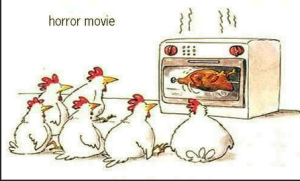
3. El semestre pasado tú __________ el mejor estudiante de la clase de español.

4. La profesora _____ a Barcelona el verano pasado.
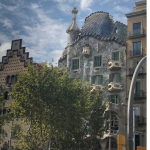
 Actividad # 1
Actividad # 1
Oraciones. Write seven (7) sentences using one item from each column. Use the preterite.
REMEMBER that the verbs SER and IR have the same conjugations in the past tense (preterite) The context will determine the meaning.
| tú ellos nosotros mi amigo y yo ustedes mi amiga yo |
(no) ir (no) ser (no) ver (no) dar |
al centro comercial estudiante una película de acción dependienta en una tienda a la playa a una amiga muy simpático (a) (s) |
ayer anoche la semana pasada el año pasado el semestre pasado anteayer |
1. __________________________________________________________.
2.__________________________________________________________.
3. __________________________________________________________.
4. __________________________________________________________.
5. __________________________________________________________.
6. __________________________________________________________.
7. __________________________________________________________.
 Actividad # 2
Actividad # 2
Preguntas. Interview a classmate using the following questions.
- ¿Cuándo FUISTE al centro comercial por última vez (last time)? ¿Con quién FUISTE?
- ¿VISTE a tus amigos anoche?
- ¿FUISTE a trabajar ayer?
- ¿Adónde FUISTE el verano pasado?
- ¿Cuál FUE tu clase favorita el semestre pasado?
- ¿FUISTE un buen estudiante?
- ¿Quién te DIO regalos en tu último cumpleaños? ¿Qué te DIERON?
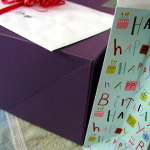
Pretérito de verbos irregulares, parte 2
1. Verbs that end in -CAR, –GAR, and –ZAR take a spelling change in the ‘YO’ form only.
2. All other forms of the verbs are regular.
3. A helpful memory trick is to remember that “CAR-GAR-ZAR’s get QUÉ-GUÉ-CÉ’s.”
| Buscar: to look for / search for | |
| (yo) Busqué | (nosotros) Buscamos |
| (tú) Buscaste | (vosotros) Buscastéis |
| (usted/él/ella) Buscó | (ustedes/ellos/ellas) Buscaron |
Common -CAR verbs:
- Practicar (to practice)
- Sacar (to take out)
- Explicar (to explain)
- Equivocarse (to make a mistake / to be wrong)
- Tocar (to play an instrument / to touch)
| Pagar: to pay | |
| (yo) Pagué | (nosotros) Pagamos |
| (tú) Pagaste | (vosotros) Pagasteis |
| (usted/él/ella) Pagó | (ustedes/ellos/ellas) Pagaron |
Common -GAR verbs:
- Jugar (to play a sport or game)
- Llegar (to arrive)
- Colgar (to hang up)
- Apagar (to turn off)
| Almorzar: to eat lunch | |
| (yo) Almorcé | (nosotros) Almorzamos |
| (tú) Almorzaste | (vosotros) Almorzastéis |
| (usted/él/ella) Almorzó | (ustedes/ellos/ellas) Almorzaron |
Common -ZAR verbs:
- Empezar (to start / to begin)
- Alcanzar (to reach / to achieve a goal)
- Rezar (to pray)
- Abrazar (to hug)
1. Yo busqué una blusa en la tienda.

2. Yo pagué ciento veinte dólares por este reloj.
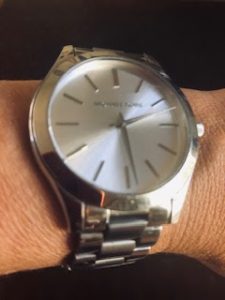
3. Yo almorcé una ensalada de pulpo.
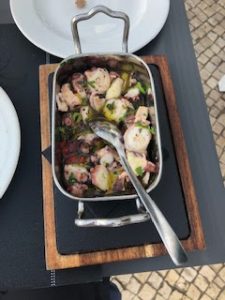
 Actividad # 1
Actividad # 1
Rellenar el espacio. Using the preterite, fill in the blank with the correct form of the verbs.
1. Ayer, (yo) ________ (tocar) la guitarra y mi amigo _________ (tocar) la batería (drums).
2. Anoche, mi hermana ___________ (sacar) la basura y yo ___________(sacar) el perro a caminar.
3. El lunes pasado, mi amiga___________ (llegar) tarde a la clase, pero yo ________ (llegar) a tiempo.
4. La semana pasada, yo ____________ (buscar) un libro de arte en la biblioteca.
5. Ayer, yo _______________ (almorzar) un sándwich de jamón y queso
y mis amigos ___________________ (almorzar) pizza.
6. Anoche, mi novia ___________ (pagar) la cuenta en el restaurante porque
yo la ____________ (pagar) el fin de semana pasado.
7. Mijo, yo ya te lo _____________ (explicar) y tu padre te lo __________ (explicar) también – NO PUEDES TENER UNA SERPIENTE (CULEBRA) COMO MASCOTA.

¡Inténtalo!
 Actividad # 2
Actividad # 2
Preguntas. Interview a classmate using the following questions.
- ¿Cuánto PAGASTE por tu teléfono celular? ¿En qué tienda lo COMPRASTE?
- ¿A qué hora LLEGASTE a tu casa ayer?
- ¿Dónde y qué ALMORZASTE hoy?
- ¿JUGASTE videojuegos anoche? ¿Cuál? ¿Cuántas horas JUGASTE?
- ¿A qué hora APAGASTE tu teléfono anoche?
- ¿Cuándo *EMPEZASTE a estudiar español?
Pretérito de verbos irregulares, parte 3
| Pedir: to ask for / to order | |
| (yo) Pedí | (nosotros) Pedimos |
| (tú) Pediste | (vosotros) Pedistéis |
| (usted/él/ella) Pidió | (ustedes/ellos/ellas) Pidieron |
| Dormir: to sleep | |
| (yo) Dormí | (nosotros) Dormimos |
| (tú) Dormiste | (vosotros) Dormisteis |
| (usted/él/ella) Durmió | (ustedes/ellos/ellas) Durmieron |
| Preferir: to prefer | |
| (yo) | (nosotros) |
| (tú) | (vosotros) |
| (usted/él/ella) | (ustedes/ellos/ellas) |
| Servir: to serve | |
| (yo) | (nosotros) |
| (tú) | (vosotros) |
| (usted/él/ella) | (ustedes/ellos/ellas) |
![]() Completar. Conjugate the -IR stem changers above in the preterite tense. Then, fill in the blanks to complete the sentences below.
Completar. Conjugate the -IR stem changers above in the preterite tense. Then, fill in the blanks to complete the sentences below.
| 1. Ayer, yo __________ churros con chocolate. | 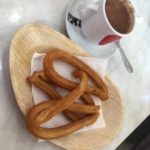 |
| 2. Mi hija __________ doce horas anoche. |  |
| 3. Yo me probé muchos pares de tenis,
pero __________________ los verdes. |
 |
| 4. Ayer, la mesera nos _____________________ café. |  |
| Repetir: to repeat | |
| (yo) | (nosotros) |
| (tú) | (vosotros) |
| (usted/él/ella) | (ustedes/ellos/ellas) |
| Seguir: to follow | |
| (yo) | (nosotros) |
| (tú) | (vosotros) |
| (usted/él/ella) | (ustedes/ellos/ellas) |
| Conseguir: to get / to obtain | |
| (yo) | (nosotros) |
| (tú) | (vosotros) |
| (usted/él/ella) | (ustedes/ellos/ellas) |
| Sentir: to feel | |
| (yo) | (nosotros) |
| (tú) | (vosotros) |
| (usted/él/ella) | (ustedes/ellos/ellas) |
![]() Completar. Conjugate the -IR stem changers above in the preterite tense. Then, fill in the blanks to complete the sentences below.
Completar. Conjugate the -IR stem changers above in the preterite tense. Then, fill in the blanks to complete the sentences below.
| 1. La profesora __________ las preguntas. |  |
| 2. Ayer, los patitos __________ a la niña. | 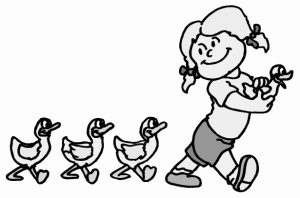 |
| 3. Yo __________ boletos para el concierto. | 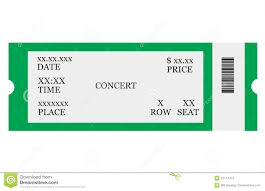 |
| 4. Anoche, me __________ mal. |  |
Other common –IR stem-changers include Convertir (se) (to convert), Mentir (to lie), and Morir (to die).
Pretérito de verbos irregulares, parte 4
- The following verbs en el pretérito take entirely new stems.
- All these verbs share the same endings and they do not have accents.
- Let’s call these “los súper irregulares.”
| Tener: to have | |
| (yo) tuve | (nosotros) tuvimos |
| (tú) tuviste | (vosotros) tuvisteis |
| (usted/él/ella) tuvo | (ustedes/ellos/ellas) tuvieron |
| Infinitive | New Stem | Endings | Conjugations |
| estar poder poner querer saber venir |
estuv- pud- pus- quis- sup- vin- |
e iste o imos isteis ieron |
estuve, estuviste, estuvo, estuvimos, estuvisteis, estuvieron pude, pudiste, pudo, pudimos, pudisteis, pudieron puse, pusiste, puso, pusimos, pusisteis, pusieron quise, quisiste, quiso, quisimos, quisisteis, quisieron supe, supiste, supo, supimos, supisteis, supieron vine, viniste, vino, vinimos, vinisteis, vinieron |
| Infinitive | New Stem | Endings | Conjugations |
| decir traer conducir traducir |
dij- traj- conduj- traduj- |
e iste o imos isteis *ERON |
dije, dijiste, dijo, dijimos, dijisteis, dijeron traje, trajiste, trajo, trajimos, trajisteis, trajeron conduje, condujiste, condujo, condujimos, condujisteis, condujeron traduje, tradujiste, tradujo, tradujimos, tradujisteis, tradujeron |
| *Hacer
*Haber |
hice, hiciste, HIZO, hicimos, hicieron
HUBO (there was) |
Ejemplos:
1. ¿Qué hiciste ayer? Trabajé todo el día.
What did you do yesterday I worked all day.
2. ¿Hubo mucha gente en la fiesta? Sí, hubo mucha gente.
Were there a lot of people at the party? Yes, there were a lot of people.
 Actividad # 1
Actividad # 1
Rellenar el espacio. Using los verbos super irregulares, fill in the blank to complete the sentences.
1. La semana pasada, mi amiga no (querer) __________ir al centro comercial conmigo (with me).
2. ¿Por qué tú no _______________ (venir) a mi fiesta de cumpleaños? ¿Estás enojado conmigo?
3. Ayer, (ser) ____________ el cumpleaños de mi hijo. Yo (hacer) _________ la cena
y mi esposo (poner)_________la mesa.
4. Yo no le (dar) _____ un regalo a mi papá en su cumpleaños porque él no (querer) ________nada.
5. Mis compañeros de clase y yo ( hacer) _________________ la tarea de español.
6. “Pero, Profesora… usted nunca nos (decir) ________________ eso.
7. La última vez que yo (ir )________ a una fiesta, (conducir) _____________ una hora.
8. ¿Tú (ver)________________la nueva película de Marvel?
¡Inténtalo!
 Actividad # 2
Actividad # 2
Ayer. Read what the following people typically do. Then, using your imagination, say what they did DIFFERENTLY yesterday. Follow the example.
Ejemplo:
Yo estoy en mi casa por la noche.
Ayer, yo ESTUVE en mi casa por la mañana.
1. Tú vienes a la universidad todos los días._____________________.
2. Mi amigo hace ejercicio en las mañanas. _____________________.
3. Yo tengo que trabajar el sábado. ___________________________.
4. Mi profesora traduce las nuevas palabras.____________________.
5. Nosotros traemos los libros a la clase._______________________.
6. Yo conduzco a mi trabajo.___________________________.
7. Hay veinte estudiantes en la clase hoy.______________________.
 Actividad # 3
Actividad # 3
¡Vamos a escribir! Use the photos and infinitives provided to write sentences in the preterite based on what you see in the pictures.
| 1. La semana pasada, los estudiantes… |
 |
| 2. Anoche Patricia… |
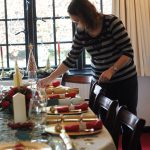 |
| 3. El viernes pasado, mis amigos y yo… |
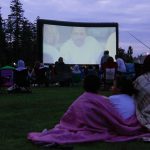 |
| 4. Este chico… |
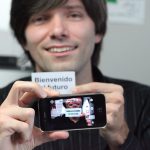 |
| 5. Anoche llovió mucho y por eso… |
 |
 Actividad # 4
Actividad # 4
¡Vamos a hablar! Practice with a classmate the following questions.
Necesitas conjugar los verbos en el pretérito.
Ejemplo:
Estudiante 1: ¿Cuándo fue la última vez que TUVISTE un examen difícil?
Estudiante 2: TUVE un examen difícil hace dos días.
1. Tener un examen difícil (TUVISTE. . . )
2. Estar enfermo/a
3. Saber (found out) algo interesante o un chisme (gossip)
4. Venir a la clase tarde
5. Haber una fiesta en tu casa
6. Traducir algo del inglés al español
7. Decir una mentira a su familia (a lie)
Hace + length of time (ago):
la semana pasada (last week)
ayer (yesterday)
el año pasado (last year)
 Actividad # 5
Actividad # 5
Encuesta: ¿Qué hiciste? Find out what your classmates DID on the following times and occasions.
Ejemplo:
E1: ¿Qué hiciste __________?
E2: (Yo) __________.
| Nombre de tu compañero | Actividad que hizo | |
| Anoche | ||
| Esta mañana | ||
| El fin de semana pasado | ||
| En tus últimas vacaciones | ||
| En tu último cumpleaños |
 Actividad # 6
Actividad # 6
¿Cuánto tiempo hace…? In groups, listen to David’s video and respond to the following questions on how long he did those activities.
- ¿Cuánto tiempo hace que fue David a un restaurante y qué comió?
- ¿Cuántos días hace que David fue a comprar comida y qué compró?
- ¿Con quién habló por teléfono la última vez?
- ¿Cuál fue la última vez que David visitó un museo? ¿Cuál?
- ¿Cuál fue el último videojuego que David jugó?
- ¿Cuál fue el último videojuego que tú jugaste?
Actividad # 7
Canción: “A Primera Vista” (Bahiano)
Paso 1. Antes de escuchar... Responde a la siguiente pregunta:
¿Crees en el amor a primera vista?
Paso 2. Letra (Lyrics). Fill in the blanks with the correct form of pretérito of the verbs in parenthesis
Verso Uno:
Cuando no tuve nada, __________ (pedir)
Cuando todo era ausencia, __________ (esperar)
En los días de frío, __________ (temblar)
Cuando tuve coraje, __________ (llamar)
Cuando llegó carta, la __________ (abrir)
Cuando escuché a Prince, __________ (bailar)
Al brillar la mirada, __________ (entender)
Cuando tuve alas, __________ (volar)
Cuando me llamaste, yo __________ (ir)
Cuando me di cuenta, estaba ahí
Cuando te encontré, me perdí
Y cuando te vi, me enamoré
Chorus:
Amarazáia, zoe, zaia, zaia
A hinhingá do hanhan. Oh!
Amarazáia, zoe, zaia, zaia
A hinhingá do hanhan. Oh! (2x)
Verso Dos:
Cuando no tuve nada, __________ (pedir)
Cuando todo era ausencia, __________ (esperar)
En los días de frío, __________ (temblar)
Cuando tuve coraje, __________ (llamar)
Cuando llegó carta, la __________ (abrir)
Cuando escuché a Bob Marley, __________ (bailar)
Al brillar la mirada, __________ (entender)
Cuando tuve alas, __________ (volar)
Cuando me llamaste, yo __________ (ir)
Cuando me di cuenta, estaba ahí
Cuando te encontré, me perdí
Y cuando te vi, me enamoré
Chorus (2x)
Paso 3. Escuchemos la canción.

